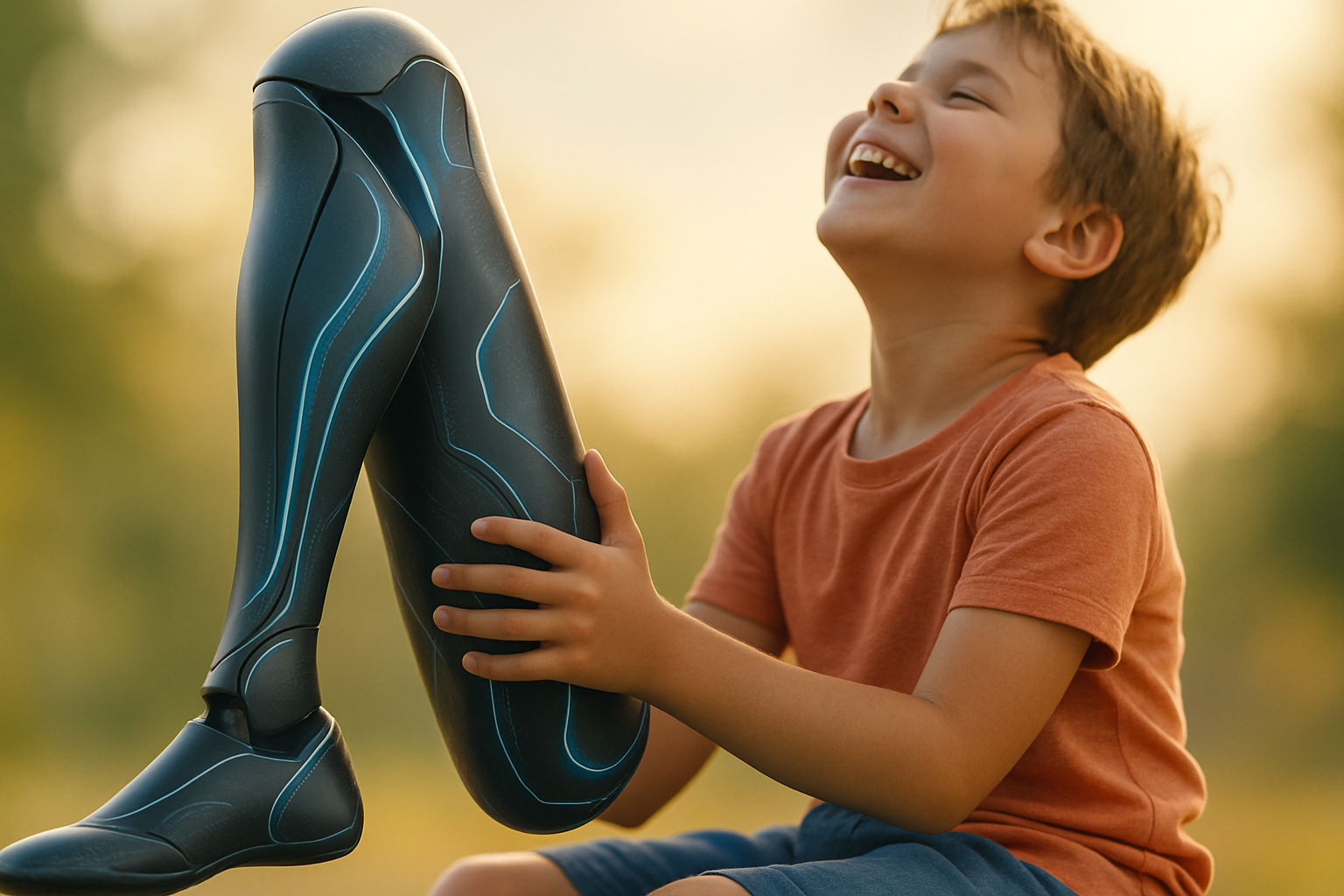
In a significant stride for both medical technology and humanitarian aid, the Lulu Strong Foundation is actively championing advancements in prosthetic technology, with a profound emphasis on its humanitarian applications. Founded by shark attack survivor Lulu Gribbin, the foundation's mission extends beyond personal recovery, aiming to revolutionize the accessibility, functionality, and comfort of prosthetics for amputees worldwide. This initiative is poised to not only transform individual lives but also to create a ripple effect across the medical device industry, highlighting the growing intersection of philanthropic vision and technological innovation as of late September 2025.
The foundation's unwavering commitment to fostering cutting-edge prosthetic solutions underscores a pivotal moment where technological progress is directly aligned with social impact. By advocating for lighter, more advanced, and readily available prosthetics, the Lulu Strong Foundation is setting a new benchmark for how humanitarian efforts can drive market innovation. This focus is particularly pertinent in a global landscape where the demand for sophisticated prosthetic care continues to rise, making the foundation's work a critical catalyst for change in the sector.
A Vision for Accessible and Advanced Prosthetics
The genesis of the Lulu Strong Foundation is deeply rooted in the personal journey of its founder, Lulu Gribbin. Having experienced limb loss, Gribbin's vision for the foundation is to ensure that other amputees, especially children, can lead full and unhindered lives. This personal connection fuels the foundation's ambitious goals, which include making prosthetics significantly more accessible, lightweight, and available in a timely manner to those in need. The foundation recognizes that over half a million individuals globally experience limb loss each year, underscoring the urgent necessity for more efficient and empathetic prosthetic solutions.
Among its key initiatives, the Lulu Strong Foundation is dedicated to advancing prosthetic technology and exploring innovative therapies that can dramatically improve the quality of life for amputees. This involves not only supporting the development of next-generation prosthetic limbs but also promoting the integration of emerging technologies such as Virtual Reality (VR) in prosthetic fitting, rehabilitation, and user training. While specific partnerships are still emerging, the foundation's clear objectives signal a strong potential for collaborations with leading research institutions, technology developers, and healthcare providers. The overarching humanitarian application of these efforts is central to the foundation's ethos, aiming to empower amputees with tools that enable greater mobility, independence, and overall well-being.
Market Implications for Prosthetic Innovators
The Lulu Strong Foundation's advocacy for advanced and accessible prosthetics is set to significantly influence the market for medical devices, particularly for companies operating in the prosthetics sector. Companies that align with the foundation's humanitarian and technological goals stand to gain considerable advantages. For instance, Össur hf. (NASDAQ Iceland: OSSR), a global leader in non-invasive orthopaedics, specializing in prosthetics, braces, and support products, could see increased demand for its innovative and lightweight solutions. Similarly, privately held Ottobock SE & Co. KGaA, a major international player in prosthetics and orthotics, could benefit from the heightened focus on advanced therapies and quicker delivery, potentially accelerating their research and development into more user-friendly and affordable options.
The emphasis on lightweight prosthetics and the integration of technologies like VR could also open new avenues for specialized firms. Companies developing advanced materials for medical applications or software solutions for VR-based rehabilitation could find new market opportunities. For example, firms like Hanger, Inc. (NYSE: HGR), a provider of orthotic and prosthetic patient care services and products, might experience a surge in demand for fitting and support services for these advanced prosthetics. Conversely, companies that fail to innovate or adapt to the growing demand for accessible and technologically superior prosthetics might face challenges, as the market shifts towards more patient-centric and technologically driven solutions championed by foundations like Lulu Strong.
Broader Industry Trends and Societal Impact
The Lulu Strong Foundation's endeavors resonate deeply with several broader industry trends, most notably the convergence of personalized medicine, assistive technology, and corporate social responsibility (CSR). This initiative highlights a growing recognition within the medical technology sector that innovation must extend beyond mere functionality to encompass accessibility, affordability, and the holistic well-being of the end-user. It aligns with the increasing investor interest in Environmental, Social, and Governance (ESG) factors, where companies demonstrating strong social impact are often viewed favorably.
The foundation's work also has the potential to influence regulatory and policy landscapes. As advanced prosthetics become more prevalent and accessible, there may be increased pressure on healthcare systems and insurance providers to adapt coverage policies, potentially leading to "Lulu's Law"-esque legislative efforts focused on prosthetic access, mirroring Lulu Gribbin's broader advocacy. Historically, philanthropic efforts have often been catalysts for significant shifts in medical care and public health policy, from vaccine development to disease research. The Lulu Strong Foundation could serve as a modern precedent, accelerating the adoption of cutting-edge prosthetic technologies and fostering a more inclusive approach to rehabilitation globally, creating ripple effects for competitors and partners alike by raising the bar for innovation and social impact.
The Path Forward: Opportunities and Challenges
In the short term, the Lulu Strong Foundation's continued championing of prosthetic innovation is likely to generate increased public awareness and potentially attract further philanthropic and investment interest in the sector. This could lead to a surge in R&D funding for startups and established companies focused on lightweight materials, advanced robotics for prosthetics, and sophisticated VR/AI integration for rehabilitation. We might see new partnerships forming between technology giants, medical device manufacturers, and humanitarian organizations, all aiming to contribute to more accessible and functional prosthetic solutions.
Looking further ahead, the long-term possibilities are transformative. Breakthroughs in biocompatible materials, neural interfaces, and machine learning could lead to prosthetics that are not only highly functional but also seamlessly integrated with the human body, offering sensory feedback and intuitive control. The challenge, however, will be to scale these innovations and ensure their affordability and equitable distribution globally. Market opportunities will emerge for companies that can balance cutting-edge technology with cost-effectiveness, while those unable to meet the evolving demands for both innovation and accessibility may face significant hurdles in a market increasingly shaped by humanitarian imperatives.
A New Horizon for Amputee Care and Market Innovation
The Lulu Strong Foundation's dedicated efforts to advance prosthetic technology with a humanitarian focus represent a pivotal moment for both the medical device industry and the global amputee community. By prioritizing accessibility, speed, and the development of lightweight, advanced prosthetics, the foundation is not merely funding research; it is actively shaping a future where limb loss does not equate to limitations. This initiative underscores a powerful synergy between philanthropic vision and technological innovation, demonstrating how a commitment to social good can drive significant market transformation.
Moving forward, investors should closely monitor companies that are actively investing in advanced prosthetic R&D, particularly those exploring lightweight materials, AI-driven functionalities, and VR integration. Furthermore, companies demonstrating a strong commitment to corporate social responsibility and those actively seeking partnerships with humanitarian organizations like the Lulu Strong Foundation may be well-positioned for long-term growth and positive public perception. The lasting impact of this movement will likely be a more inclusive, technologically advanced, and empathetic approach to amputee care, setting a new standard for how technology can truly serve humanity.
This content is intended for informational purposes only and is not financial advice





